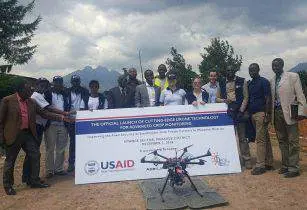An aerial drone to monitor crops for Irish potato farmers in Rwanda’s Northern Province was launched recently in Musanze district
The US Agency for International Development (USAID), through its private sector driven agricultural growth project (PSDAG), is partnering with AgriLift to pilot the drone-based crop monitoring technology.
It will serve 2,000 potato farmers affiliated with 20 potato cooperatives in the Imbaraga Cooperative Federation located in Nyabihu, Burera and Musanze districts.
The drone takes overhead images of growing crops at specific intervals. The images are then analysed with an open-source computer model of plant growth, which was specifically developed for potato farms. The drone technology can identify the optimal maturity of potato plants for farmers, and can also spot nutrient deficient or diseased crops.
AgriLift’s goal is to use ‘the eye in the sky’ to provide local farmers and agribusinesses with rapid information on their crops, allowing them to take corrective measures almost immediately.
At the beginning of the September-January planting season, AgriLift conducted its first drone test flights in Musanze. Until now, 242 plots of farmland under four cooperatives have been registered for the technology.
Speaking at the launch, USAID country mission director Marcia Musisi-Nkambwe said, “It’s our hope that this aerial monitoring technology will directly increase the income of small-scale Rwandan farmers. USAID is proud to be a significant partner in this achievement.”
Officials noted that the real-time Irish potato crop data is also a powerful analytical tool for private sector buyers, agricultural equipment dealers and financial services providers.
Matt Gantz, managing director of AgriLift, said the new technology would provide farmers with an innovative tool that can be used to better understand the challenges they face. He added the first step is demonstrating the value of the technology and ensuring that it can be useful to farmers and farmer associations and cooperatives.
Rwanda, Gantz noted, is a primarily agrarian economy, and increasing yields not only benefits the farmers but the overall economy.




